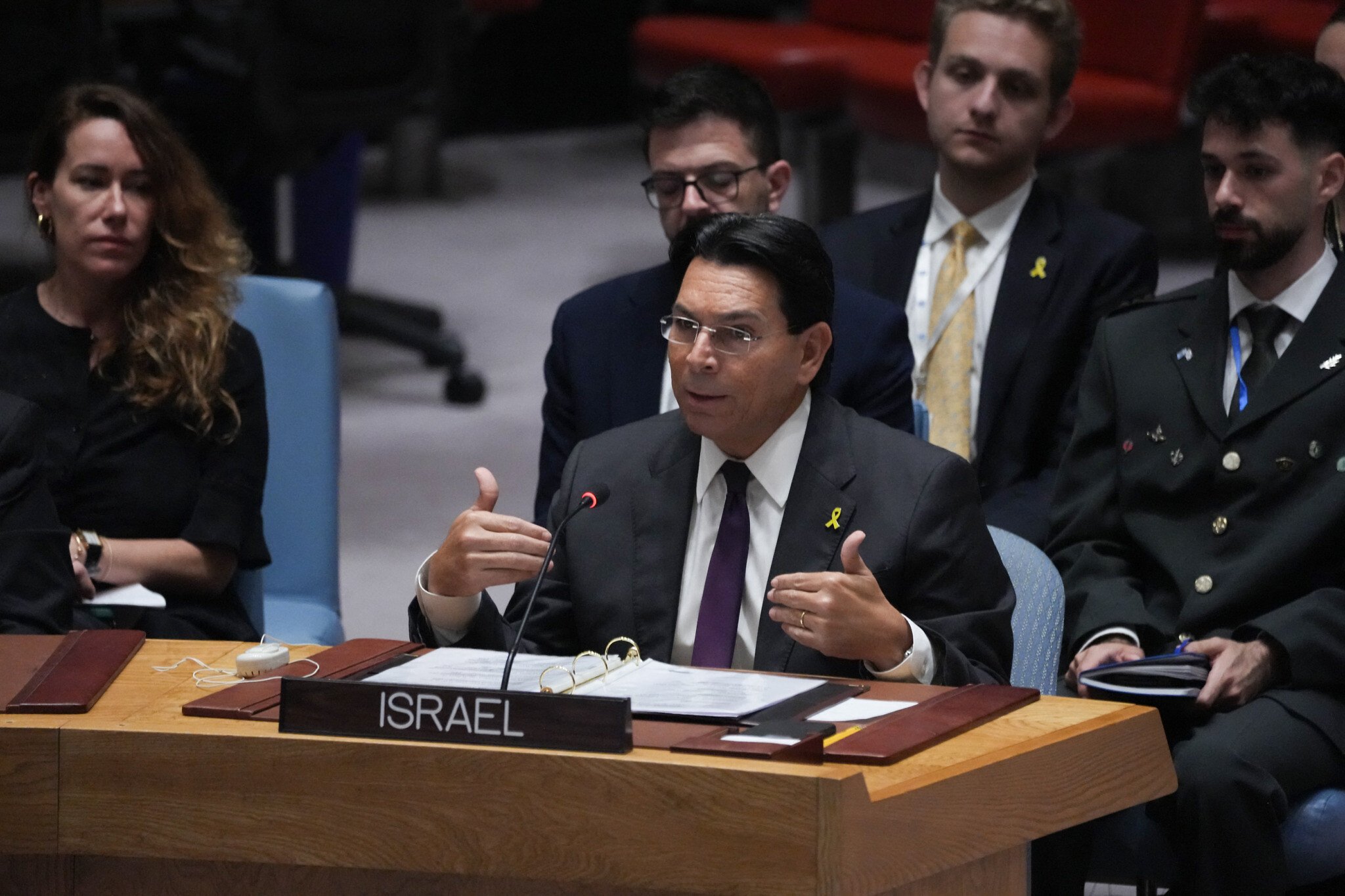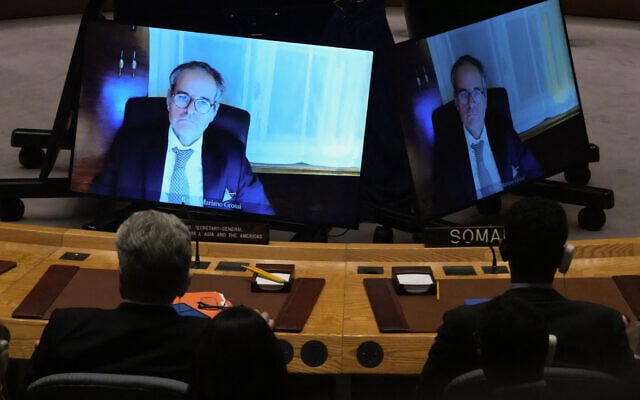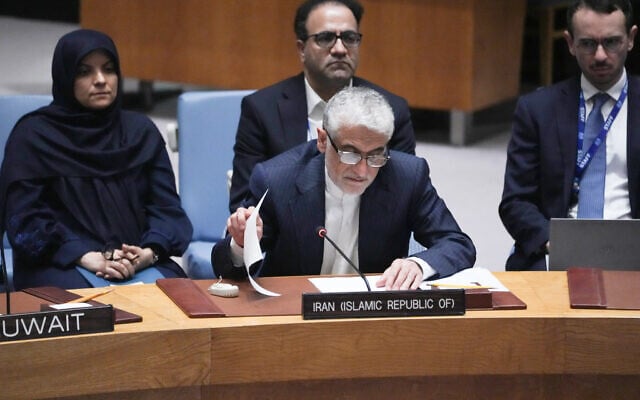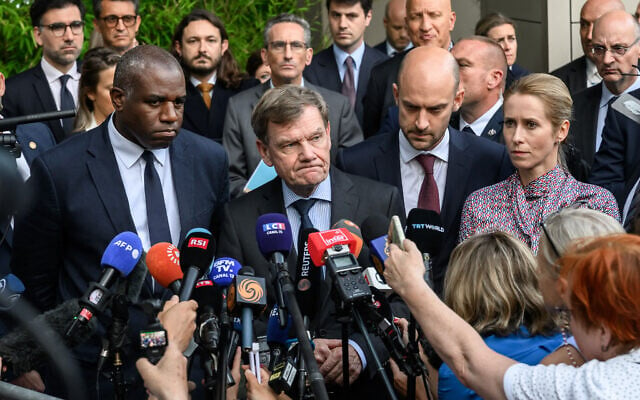



Israel hailed, and Iran condemned, the US’s early-Sunday strikes on the Islamic Republic’s nuclear program at an emergency meeting of the UN Security Council later in the day, in which most countries called for immediate negotiations to end the ongoing fighting.
United Nations chief Antonio Guterres said the American strikes on Iran’s key nuclear facilities marked a “perilous turn” in the region.
“I have repeatedly condemned any military escalation in the Middle East,” the secretary-general said. “The people of the region cannot endure another cycle of destruction. And yet, we now risk descending into a rathole of retaliation after retaliation.”
Rafael Grossi, director of the International Atomic Energy Agency (IAEA), also called for restraint as he voiced fears over “potential widening” of the conflict.
“We have a window of opportunity to return to dialogue and diplomacy. If that window closes, violence and destruction could reach unthinkable levels, and the global non-proliferation regime as we know it could crumble and fall,” Grossi said.
Speaking to the Security Council by video link, he said there were visible craters at Iran’s key Fordo nuclear facility, but noted that no one had been able to assess the underground damage there.
He added that “armed attacks on nuclear facilities should never take place and could result in radioactive releases with grave consequences within and beyond the boundaries of the state which has been attacked.”
“Last night, history changed,” declared Israel’s Ambassador to the UN Danny Danon, at the Security Council meeting.
“The United States, the leader of the free world, removed the greatest existential threat facing the free world,” he says. “This was not a war of choice; this act was a necessity; it was a righteous act.”
Danon railed against states who criticized the US strike: “Where were you when Iran raced toward the bomb?
“Where were you when it enriched uranium far beyond the point of civilian use? When it buried entire fortresses beneath mountains to prepare for our extermination? Where were you when Iran turned negotiation into theater and deceit into strategy?”
“You were silent. You were complicit. You were afraid. You were bystanders,” he charged.
Iran’s representative, Amir Iravani, blasted the “barbaric assault” on Iran, saying “history will not forget these tragic days,” identifying Iran as a “peace-loving” and a “non-nuclear state,” and Israel as a “criminal regime.”
Iravani said that “internationally wanted war criminal Netanyahu succeeded in hijacking US foreign policy, dragging the United States into yet another costly baseless war.”
“Iran reserves its full and legitimate right under international law to defend itself against this blatant US aggression and its Israeli proxy. The timing, nature and scale of Iran’s proportionate response will be decided by its armed forces,” he said.
On Sunday, Russia, China and Pakistan circulated a draft resolution with other Security Council members that called for an “immediate ceasefire” in Iran.
The text, seen by AFP, also “condemns in the strongest terms the attacks against peaceful nuclear sites and facilities.”
But the Council was very much divided, with other members such as France and Britain instead calling for Iran to exercise restraint.
In a joint statement on Sunday, the UK, France and Britain urged Iran not to take any actions that would further destabilize the region.
“We have consistently been clear that Iran can never have a nuclear weapon and can no longer pose a threat to regional security,” the government heads of the three countries said.
“We call upon Iran to engage in negotiations leading to an agreement that addresses all concerns associated with its nuclear program,” they added.
Similar comments came on Sunday from Australia, with Prime Minister Anthony Albanese saying that Iran should not undertake any further action that could destabilize the region, and Foreign Minister Penny Wong saying Canberra supported the US strike but now wants de-escalation and a return to diplomacy.
US strikes on Sunday targeted three of Iran’s nuclear facilities. The operation came after more than a week of strikes by Israel that damaged Iran’s nuclear sites, eradicated the country’s air defenses, and took out many of its military brass and top nuclear scientists.
Israel says its sweeping assault is necessary to prevent the Islamic Republic from realizing its declared plan to destroy the Jewish state.
Iran has retaliated for Israel’s strikes by launching over 500 ballistic missiles and around 1,000 drones at Israel.
Iran, which avowedly seeks Israel’s destruction, has consistently denied seeking to acquire nuclear weapons. However, it has enriched uranium to levels that have no peaceful application, has obstructed international inspectors from checking its nuclear facilities, and expanded its ballistic missile capabilities, all while repeatedly threatening to wipe Israel off the map. Israel says Tehran has recently taken steps toward weaponization.



